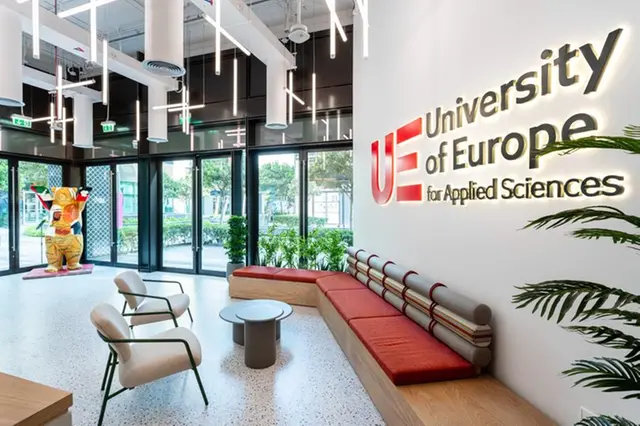The University of Europe for Applied Sciences in Dubai (UE Dubai), the inaugural German university in the UAE and the first branch of UE outside of Germany, reveals crucial skills essential for graduates to thrive in an AI-dominated future job market. As technological advancements continue to shape new career paths, UE Dubai underscores the importance of adapting education to meet the demands of a rapidly evolving landscape.
Futurists have predicted future AI-related careers to include precision farming analysts, cosmic reality engineer and AI nurses. These emerging roles underscore the importance of the identified skill sets in navigating the complexities of AI-driven industries.
In a 2023 report by PwC and the World Economic Forum, it was projected that by 2030, a staggering 85 million job vacancies could remain unfilled due to a shortage of skilled workers, potentially leading to $8.5 trillion in lost annual revenues. Recognizing this imminent challenge, the faculty members at UE Dubai, including Prof. Dahlia Mahmoud, an expert in Visual & Experience Design, and Prof. Dr. Eman AbuKhousa, an expert in Information Technology and Communication, have identified key skills vital for future career success. Through a blend of academic expertise and entrepreneurial insight, they have curated a comprehensive list to equip students with the necessary tools for career readiness and success.
Technical skills:
Students will be required to be proficient in AI and data analytics for predictive modelling and analysis. This encompasses a deep understanding of complex systems, robotic automation, IoT devices, and the use of automated tools, ensuring they can navigate the technological landscape of the future effectively.
Critical thinking Skills:
Critical thinking is fundamental for devising effective solutions with the ability to interpret data, develop strong problem-solving capabilities and make informed decisions essential for optimizing outcomes and thriving in the AI workforce. This skill set will empower graduates to address complex challenges with strategic insights, thereby preparing them to navigate the complexities of their future professions with analytical prowess.
Soft skills:
Effective communication is crucial for conveying findings to stakeholders and management. Leadership skills and emotional intelligence will empower students to excel in collaborative settings, fostering a workforce that is adaptable, empathetic, and capable of inspiring innovation.
Creative skills:
Innovation goes beyond generating original ideas; it requires design proficiency to create visually captivating and functional designs tailored to user needs. Students will learn to bridge the gap between creativity and practicality, ensuring their contributions are both innovative and applicable in real-world scenarios.
Sustainability competencies:
The responsibility of future employees towards sustainability is crucial and cultivating the necessary competencies, including systems thinking, collaborative decision-making, autonomy, empathy, and strategic problem-solving, is imperative to becoming environmental responsible citizens. Additionally, it is important for these competencies to be accompanied by the requisite values and motivations to drive sustainable actions. [2]
Commenting on the skillset, Professor Dr. Eman AbuKhousa, Professor of Information Technology and Communication at UE Dubai, stated: “The highlighted skills are essential for all future-focused careers, with their specifics tailored to each job. Our curriculum prioritizes these career-ready practices and 21st-century competencies to foster lifelong learning and employability. In data science, success hinges not just on analysing data, but on foreseeing implications, crafting forward-thinking strategies, and making ethical decisions. It’s about understanding the web of data within complex systems and using this insight to navigate future challenges. This approach embodies the essence of future readiness: strategic foresight, critical analysis, and ethical consideration, ensuring that our advancements today pave the way for a sustainable tomorrow.”
Professor Dahlia Mahmoud, Professor of Visual & Experience Design at UE Dubai, stated, “Creativity is at the heart of future innovation. Our curriculum is designed to nurture innovative thinking and design management proficiency in our students, ensuring they can generate original ideas and translate them into visually captivating and multi-faceted design solutions. When combined with analytical and sustainable skills, creativity enables graduates to envision and shape the future, crafting inspired growth strategies tailored to their specific context and the data interpreted.”
Through a comprehensive curriculum blending theory and practical experience, students at UE Dubai are equipped with the skills and insights needed to thrive in today’s data-driven world. By focusing on the mentioned skillsets, UE Dubai ensures that graduates emerge as invaluable assets, ready to lead in innovative industries and contribute to economic growth.
Applications are now open for UE Dubai, for more information, please visit https://www.ue-germany.com/about-us/locations/dubai

